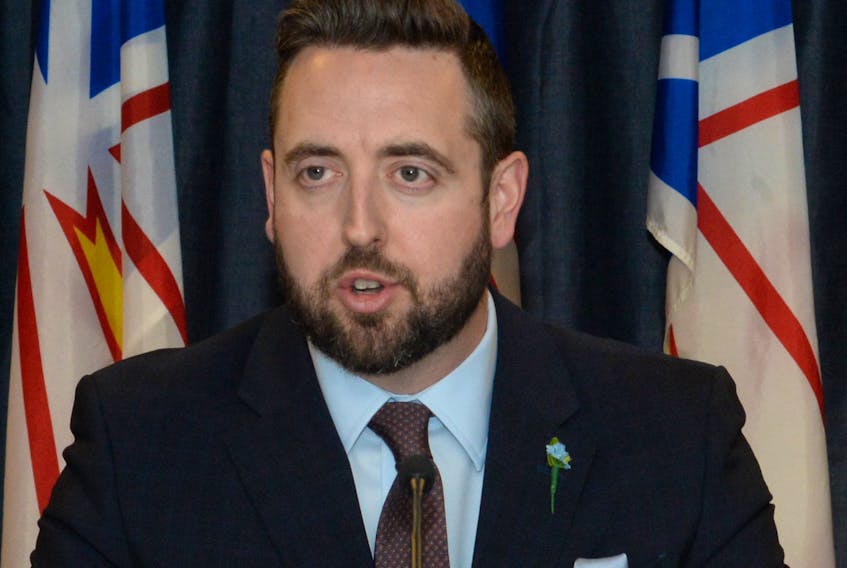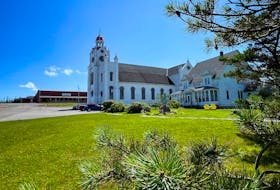Money allocated in this spring’s provincial budget to go toward the establishment of a serious incident response team (SIRT) will enable the Department of Justice to hire key people toward getting a SIRT in place — and that process includes determining whether the province will be part of an Atlantic SIRT or go with a team of its own.
In Budget 2018, $250,000 was announced for this year and $500,000 in future years to establish a SIRT to provide an increased level of transparency and help ensure people have trust in the justice system.
“With the money we have now, one of the big steps will be to hire an executive director. That’s the civilian who will run the team,” Justice Minister Andrew Parsons said. “And so, I think whether you are part of an Atlantic force or a standalone, you need that individual so that work will happen going forward.
“As for what model, that’s still not set in stone. A lot of work still needs to happen, but even just putting the legislation in place (last fall), that allows for us to launch the team no matter what model you use, and now having the money behind it is a huge step. Now it’s just the practical getting it up and running.”
The need for the province to have its own SIRT was highlighted during last year’s Commission of Inquiry Respecting the Death of Donald Dunphy, after questions were raised about how police investigate police.
In his report, commissioner Leo Barry noted that the success of civilian-led oversight in the province will depend upon adequate long-term funding.
Finance Minister Tom Osborne, in his budget speech when announcing the funding, said the provincial government is committed to improving access to justice and increasing transparency and accountability in law enforcement.
Parsons noted the issue of an Atlantic SIRT was on the agenda during an Atlantic premiers meeting last year, with support expressed by all four premiers of proceeding on it.
He also noted that during a meeting in St. John’s of SIRT teams and their directors from across Canada a few months ago, he received some valuable advice on how to proceed.
“I had a chance to have a nice, frank sit-down with them and the big message they got through to me was do not rush it,” Parsons said. “Other provinces have fallen victim to that and it can be disastrous. As much as everyone wants it up and running, if you don’t do it right, you are going to have issues that will go with that team through its existence.
“Even though you want an independent investigative body, you still have to have a relationship with all the other stakeholders, including the people you are investigating and everybody else. That’s been one of the issues.
“I think we’ve taken a lot of action in the last year. You’ve seen the legislation passed and there has been internal work. We got the funding announcement in this year’s budget. We are still working on the model I’d like to see, and this was part of the Dunphy Inquiry recommendations, an Atlantic-type SIRT team. I think there are a lot of bonuses to that, such as sharing of resources. If you have four provinces working together, it gives you a lot of advantages that having your own stand-alone may not have.”
Parsons noted, however, that with the head of SIRT based in Halifax leaving recently to head up the SIRT in British Columbia, it has slowed talks down until the Nova Scotia team has a new permanent director in place.
“With that change it was really hard for us to work with them to see what kind of model could be struck when they are trying to figure out who is going to run their own,” Parsons said. “Given the delay that we had due to Nova Scotia, that sort of set the process back just a little bit.
“One of our next steps down the road will likely be getting that (civilian executive director) in place. No matter the model we go with, no matter what you do, you need that person to head it up.”
With the workload that most SIRT teams in Canada have, Parsons said, Newfoundland and Labrador has been lucky in getting the work it needed done. He said there are still agreements in place to do further work while the new SIRT is being set up.
“We’ve been extremely lucky and using a lot of goodwill to get the work done here that we needed over the last couple of years,” he said. “We’ve had a lot of significant investigations. But it gets to the point where they are going to say, ‘Look, are we going to do our own files, or their files,’ so we have to get something up and running. And we have measures in place to ensure the work gets done even while we are still in this process.”
Parsons said he can’t put a timeline on when the new SIRT will be in place, but the work is ongoing.
“I’d really like to see it during 2018, but listening to every director from across the country saying don’t rush it, gives me the belief that it is better to do it right, than doing it quick,” he said. “In the meantime, it doesn’t compromise us from being able to do the work as it happens. We still have MOUs, the ability to reach outside. It’s not a case of where there is not work happening while we are waiting to set this up. We are going to set this up right, and in the meantime the necessary work will be completed.”









